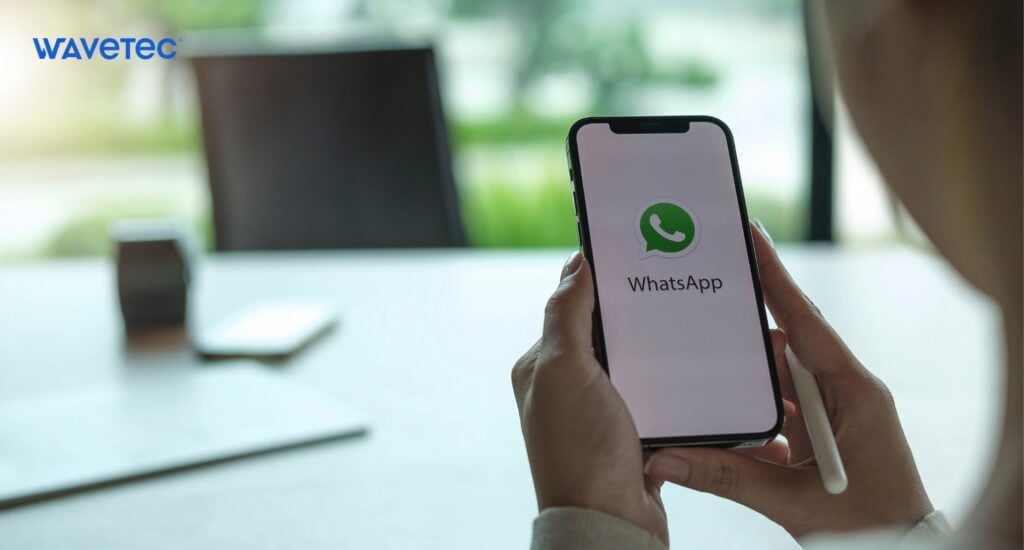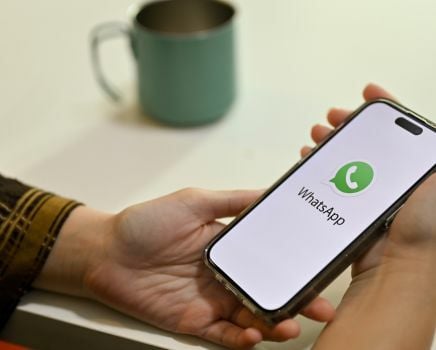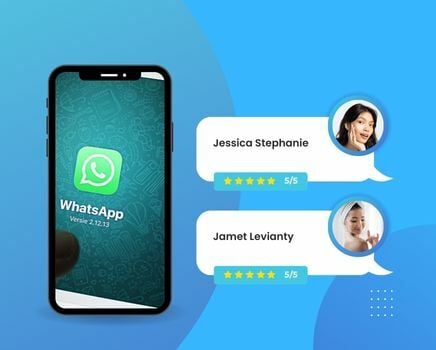In this fast-paced era, messaging apps have become essential to everyday communication. WhatsApp is one such messaging platform that has grown incredibly popular among businesses, especially healthcare organisations. By the end of 2022, there were 2.4 billion WhatsApp users, and steadily increasing. This has been evident since the global pandemic when we witnessed rapid digitization and technological advances in healthcare.
WhatsApp’s simplicity, accessibility, and low cost make it an appealing alternative for healthcare professionals wishing to engage with patients. WhatsApp allows easy multimedia sharing between healthcare providers and patients.
This includes sharing photographs, videos, and voice notes, to explain their medical condition in detail. It is convenient for healthcare providers to connect with patients and provide medical information easily.
Furthermore, healthcare practitioners can use WhatsApp to send appointment reminders, give health suggestions, send prescriptions and follow up with patients after their visits.
WhatsApp is a secure platform that protects patients’ privacy with its message end-to-end encryption. The real-time cloud communication capabilities make it an ideal platform for healthcare providers to tend to patient inquiries quickly, leading to improved patient experiences.
In this blog, we explore the best strategies you can adopt for WhatsApp marketing for healthcare. If you want to know about the privacy laws on using WhatsApp for healthcare, look no further!
Let’s dive into the details of WhatsApp business for healthcare.
Why Use WhatsApp for Healthcare Marketing?
Compared to traditional communication channels like phone and email, WhatsApp presents several advantages for healthcare marketing. The main advantage is that it allows healthcare providers and patients to share images, videos, and voice notes. This allows them to convey complete information and complex medical information more easily.
Time is of the essence in the healthcare industry. Real-time communication on WhatsApp enables healthcare providers to respond to patient inquiries promptly. This not only delivers care immediately but also reduces wait times and improves patient experiences.
WhatsApp messages can be easily saved, searched, and accessed anytime, providing a comprehensive record of a patient’s medical history. This feature simplifies keeping track of patient communication and responding to inquiries immediately. Since WhatsApp is widely used and user-friendly, it is well-appreciated by patients and serves as a cost-effective marketing strategy.
When used to its maximum potential, WhatsApp has been a game changer in the health industry. WhatsApp partnered with the California Department of Public Health and launched a free chatbot tool to combat COVID-19 misinformation. The chatbot helped users access information for booking vaccination appointments and obtaining vaccination records.
Ensuring Compliance with Privacy Laws and Regulations
The Health Insurance Portability and Accountability Act (HIPAA) governs patient data in the United States, while for the European Community, it is the General Data Protection Regulation (GDPR).
According to a study from 2020, the main obstacle to using WhatsApp for patient data is the inability to keep the data entirely confidential since anyone can use a smartphone.
Healthcare providers using WhatsApp for communication with patients must adhere to ground rules. Healthcare providers must explain the purpose of using WhatsApp for communication, how patient privacy will be maintained and the possible risks involved.
Then, written consent must be obtained from patients. The patient should be given the liberty to opt-out at any given time.
Ensure patients’ anonymity by avoiding using personal information that could lead to patient identification. This can be the name and surname, an identifier, the date of birth or the address.
Use end-to-end encryption to protect patient data on WhatsApp from third-party apps and train employees to deal with data breaches.
Best Practices for WhatsApp Marketing in Healthcare
Providing Value to Customers Through Personalized and Relevant Content
WhatsApp Marketing in healthcare can be highly effective when it provides value to patients through personalized and relevant content. The digitization of healthcare with WhatsApp has gained an overwhelming response from patients, making healthcare services more accessible. Patients can contact healthcare providers and get immediate replies to queries.
Healthcare providers can use WhatsApp to send personalized content and establish a deeper connection with patients, improving patient engagement. This includes health tips and nutritional plans for managing common conditions like diabetes, hypertension, or stress.
Appointment reminders can also be sent via WhatsApp Appointments, which can help reduce no-shows and improve patient attendance. Providers can also follow up with patients post-visit to ensure they follow their treatment plan. Medication reminders can be sent via WhatsApp to help patients stay on track with their medication schedules.
Healthcare providers must understand their customers’ needs and preferences to achieve this. This can be done by segmenting audiences based on age, gender, and health concerns. Once the audience is segmented, healthcare providers can use messaging templates to create personalized messages.
For example, patients with diabetes may receive messages about managing their blood sugar levels, while pregnant women may receive messages about prenatal care. Additionally, share educational content such as infographics or videos to help patients better understand and manage health conditions.
Tracking Patients and Collecting Reports
Since WhatsApp marketing allows sharing of files, laboratories can share test results with patients in a secure and timely manner and keep them updated with delays. Similarly, patients can send health reports or updates to healthcare providers via WhatsApp. This creates an efficient communication channel and allows real-time monitoring of symptoms or health conditions.
Maintaining a Professional and Empathetic Tone
When using social media for business, switching from a professional outlook to an informal one is very easy. Healthcare professionals, thus, have to strike a balance between empathy and professionalism with patients.
As a professional, keep your language and tone informative yet supportive. Try using WhatsApp features of voice or video calls while conveying sensitive information and maintaining a positive outlook. Be there for your patient. Support goes a long way in building long-term relationships.
Managing Contact Lists Effectively
Since WhatsApp is a multi-purpose tool, managing contact lists effectively is key to maintaining quality leads. Having a well-organized contact list ensures that the right message is reaching the right audience.
Provide a clear and compelling call-to-action as a prompt to collect contact information on various marketing channels, such as social media profiles and websites. This could be an invitation with a link to join a WhatsApp group or to receive exclusive content via WhatsApp. Filter your contacts based on demographics and previous interactions.
Privacy laws should be considered when collecting and managing contact information. It is crucial to obtain consent from patients before adding them to a WhatsApp contact list or a group and providing an opt-out option for those who no longer wish to receive messages.
Avoiding Spamming and Overmessaging
WhatsApp allows an uninterrupted flow of messages which can result in the healthcare provider or service over messaging the patient. This, in turn, frustrates patients and may add to an ailing patient’s anxiety levels. Spamming patients with the same messages results in negative marketing for your business, as they are likely to unsubscribe from the list.
To ensure you do not violate a patient’s privacy or send patients the wrong reports or messages, use messaging templates to keep a professional tone. Do not send messages at odd times and value your patients’ availability. Use WhatsApp settings to limit the sending frequency of messages and reminders.
Here is an example that you can use with your patients:
“Dear Mr Jack,
We hope this message finds you well. We wanted to check in with you regarding your recent visit. Please let us know if you have any questions or concerns about your treatment plan or medication. We also want to remind you of your upcoming appointment on 21st April at 12 PM. Please let us know if you need to reschedule as soon as possible.
Thank you for choosing us as your healthcare provider.
Best regards,
Utilizing Automated Messaging and Chatbots
Use technology to your benefit in repetitive tasks that can be automated. These include using tools such as WhatsApp Appointments to book appointments, reschedule, or send patients reminders.
Investing in chatbots allows you to answer patient questions, send medication or laboratory reminders, and save healthcare providers’ time. Chatbots and AI technology can be used to collect patient data, screen symptoms, and triage based on severity.
Responding to Customer Inquiries and Feedback Promptly
The healthcare industry demands quick responses from healthcare providers in an attempt to provide care without delays. For this purpose, set up chatbots with pre-existing questionnaires and answers to reply to patients immediately. Integrated with Customer Feedback Solutions, WhatsApp can process customer feedback surveys and monitor customer satisfaction. Assign a staff member to reply to queries that chatbots cannot answer, reach out to patients, and improve customer experience.
Conduct Remote Consultations Using Open-Ended Questions
WhatsApp marketing of healthcare relies heavily on its messaging feature, which can help healthcare providers learn about patients’ conditions in little time. This can be done by asking open-ended questions that will give healthcare providers a deeper understanding of a patient’s symptoms.
Patients feel more engaged in their healthcare by conversing and sharing thoughts and opinions, and help healthcare providers can listen intently. This leads to more accurate diagnoses and tailored treatment plans.
Incorporate Your Current CRM System for Improved Efficiency
The CRM of a healthcare organization can be integrated with WhatsApp to allow access to patient information. A healthcare provider can use WhatsApp to send appointment reminders, and the CRM system can update the patient’s appointment status automatically.
This integration can help to reduce manual processes and improve the accuracy of patient information. It also gives healthcare providers insights into patients’ behaviour, compliance and preferences, allowing for a more personalized approach to communication and marketing.
Disseminating Health and Wellness Advice
WhatsApp is a platform of mass communication and healthcare providers can follow several steps to make health and wellness advice more effective. Tailor advice to the individual patient, considering their health concerns. Use multimedia content, such as images, infographics and videos, to make engaging content. The advice needs to be actionable, with clear steps to follow for the patient.
Frequently Asked Questions
How can healthcare providers use WhatsApp for marketing?
WhatsApp is a tremendous tool for healthcare marketing, allowing doctors to create relationships with patients and improve communication. Healthcare providers can use WhatsApp marketing by providing patients with relevant and timely information, such as updates on new services or health recommendations. They can also use it to make appointments, send reminders, and hold virtual consultations. This mandates gaining patient consent and maintaining privacy. Is WhatsApp marketing for healthcare effective?
Are there any legal or ethical concerns with WhatsApp marketing for healthcare?
Yes, there are legal and ethical concerns with WhatsApp marketing for healthcare. Privacy regulations such as HIPAA (in the US) and GDPR (in the EU) advocate protecting patient information and obtaining consent before using communication platforms like WhatsApp. Sharing patients’ confidential clinical information on WhatsApp violates the rules. It is important to consider the potential impact on patient trust and confidentiality and the risk of spamming patients with excessive or irrelevant messages.
How can healthcare providers ensure the security and privacy of patient information on WhatsApp?
To ensure the security and privacy of patient information on WhatsApp, healthcare providers should obtain patient consent before communicating on the platform and use end-to-end encryption to protect messages from unauthorised access. They should avoid sharing confidential patient information and use WhatsApp only for non-sensitive communications such as general information sharing and appointment scheduling. Additionally, healthcare organizations should implement policies and procedures to ensure compliance with HIPAA or GDPR, including regular employee training on best practices for using WhatsApp in healthcare.
Can WhatsApp marketing for healthcare be integrated with other marketing channels?
Healthcare organizations can integrate WhatsApp marketing with other channels to promote their contact information. They can share their WhatsApp details on social media, add a WhatsApp call-to-action button in email campaigns, use SMS marketing to drive engagement, and add a WhatsApp chat widget to their website. These tactics help engage with patients in real-time, provide quick answers to their queries, and share updates on services. Additionally, healthcare providers can integrate WhatsApp with Queue Management Services and Online Appointment Services for virtual queuing.
Conclusion
Join the team of healthcare organizations which benefit greatly from using WhatsApp to communicate with patients and provide personalized and timely information. With the real-time communication capabilities offered by WhatsApp, healthcare providers can improve patient satisfaction, increase engagement, and ultimately achieve better patient outcomes.
Adhere to privacy laws and regulations, prevent over-messaging, and use messaging templates to maintain patient trust. By taking these measures, you can build stronger relationships with your patients and improve their quality of life.
Change the landscape of your service by investing; contact us!
BOOK A FREE DEMO





